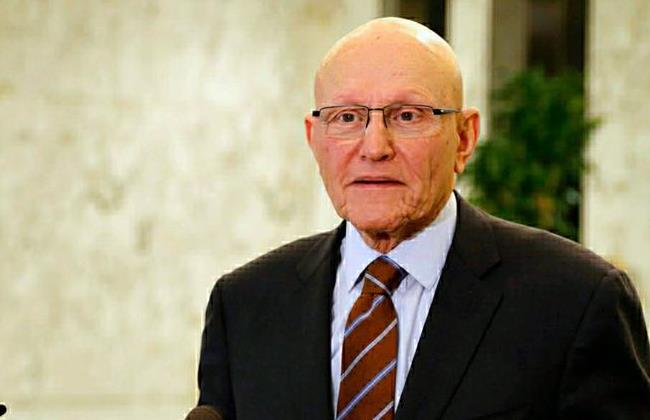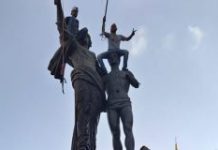Salam pessimistic, but Berri upbeat on presidential vote
Hussein Dakroub/Hasan Lakkis/The Daily Star
Nov. 24, 2014
BEIRUT: Prime Minister Tammam Salam sounded downbeat Sunday about the election of a new president soon, in sharp contrast with Speaker Nabih Berri, who has repeatedly spoken about “positive internal and external signals” to break the 6-month-old presidential stalemate.
“The presidential election is no longer easy,” Salam told visitors at his Mosseitbeh residence.
Asked to comment on Berri’s optimism, Salam replied he did not have any specific details and information pointing to positive developments over the presidential election. “Speaker Nabih Berri, in his position as Parliament speaker and the head of a large parliamentary bloc, has information which I don’t have for several reasons, the most important of which is that I don’t head a political or parliamentary bloc.”
In an interview with the Voice of Lebanon radio station Saturday marking the 71st anniversary of Independence Day from France in 1943, Salam said external circumstances were not conducive to the election of a president.
However, Berri stuck to his optimism over the presidential election, reiterating that he still saw “positive signals” both at home and abroad in this regard.
Berri, according to visitors, called for watching the outcome of the ongoing negotiations in Vienna between Iran and Western powers over Tehran’s nuclear program.
Berri also said he was still optimistic about launching a long-awaited dialogue between the Future Movement and Hezbollah, whose strained ties have heightened political and sectarian tensions in the country.
“This dialogue will be held without preset conditions. This point has been settled and is behind us,” Berri was quoted as saying. He said efforts were underway now to prepare the agenda of the dialogue.
Speaking to visitors, Salam said he was in contact with all the parties over the presidential impasse and was working to energize Cabinet work, which has been paralyzed as a result of differences among the ministers.
“I am carrying a trust and I support and encourage any solution in the Cabinet for any of the [unresolved] files. But this is not enough because what is required is a decision by the political parties to reach positive results,” Salam said.
He added that he had adopted the formula of consensus among ministers in order to facilitate the government work.
Among the unresolved issues he cited were the Syrian refugee crisis, the 26 Lebanese soldiers and policemen still held hostage by militants on the outskirts of the Bekaa town of Arsal, the contracts of mobile phone operators, oil prospecting tenders and the issue of solid waste disposal.
Salam, who canceled Independence Day celebrations because of the deadlock over electing a president, received a letter Sunday from French President Francois Hollande congratulating him on the independence anniversary, which fell Saturday, and pledging support for Lebanon’s unity and stability.
Hollande called in his letter for the election of a president as soon as possible. “France will continue to work, more than any other time in the past, in the interest [of Lebanon’s], unity, stability and sovereignty,” he said in his letter to Salam.
The French president said his country’s support would be manifested in the work of the International Support Group for Lebanon, which was established to help cope with the Syrian refugee crisis and Syria-linked security problems – by supporting the Lebanese Army and state institutions.
Hollande expressed his satisfaction with the fact that Lebanon is garnering international support in an effort to reinforce its security. He said the implementation of the French-Saudi donation pledged to the Lebanese Army serves to bolster the military’s capabilities in the battle against terrorism.
Shipments of French weapons for the Lebanese Army paid for by a $3 billion grant from Saudi Arabia are expected to start arriving in Lebanon early next year.
For his part, Kataeb Party leader Amine Gemayel called for a single dialogue among the rival political leaders to agree on the election of a president. He implicitly accused Hezbollah and MP Michel Aoun’s Free Patriotic Movement of scuttling the presidential vote with the aim of changing the country’s political setup.
“Why don’t we meet in a single dialogue session to agree on one decision, that is the election of a president?” Gemayel said in a speech at a ceremony marking the 78th anniversary of the Kataeb Party’s founding. “Why don’t we meet first as Christian leaders since we are mainly responsible and concerned with this top post?”
“Delaying the election of a new president has ceased to become a tactical political stance to boost the position of one side at the expense of another,” Gemayel said, adding: “It has become a strategic stance [that aims] to change the Lebanese status-quo and the Lebanese Republic.”
Gemayel said such a strategy violates not only the political system, but also the formula by which the country was founded.
“It is an adventure that nobody can control, neither by force, nor by law, and neither by the Constitution, nor by dialogue,” he said.
“We fear that some practices are part of an obstructionist process that would later justify a coup against the [political] system, the National Pact and the entity,” Gemayel added.
Lebanese Forces chief Samir Geagea said he was ready to visit Aoun at his residence in Rabieh, if this would help reach an agreement to end the presidential vacuum. In an interview with MTV website to be published Monday, Geagea described Aoun’s latest initiative to break the presidential deadlock as “excellent.”Aoun last week offered to face off with Geagea, the March 14-backed candidate, in a presidential vote in Parliament if the battle was restricted to them only. However, Aoun’s proposal has been denounced by many March 14 politicians as “undemocratic.”
Separately, Aoun’s parliamentary Change and Reform bloc is expected to hold a special meeting at 10 a.m. Monday ahead of the Constitutional Council’s decision, expected this week, on the challenge presented by the bloc against the extension of Parliament’s mandate for two years and seven months. If the council does not pronounce its verdict within 20 days after the challenge was presented, the extension of Parliament’s term would become effective.

















